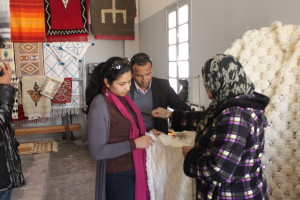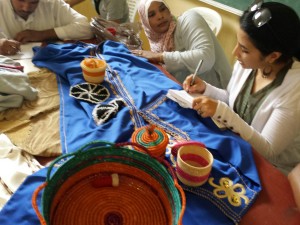By Safa Hajjaj – Entrepreneur, Atlas Corps Fellow at Meridian International Center from Morocco @safahajjaj
First some introductions are in order. Safa Hajjaj joined Meridian in September 2014 as an Atlas Corps Fellow to serve as Curriculum Developer in the GlobalConnect Division and help develop Meridian’s Training. In this capacity she assists with International exchange programs, especially with those related to entrepreneurship and social action planning for both youth and professionals. Prior to joining Meridian, Safa served for over five years in the non-profit sector, mainly with the Junior Chamber International (JCI), as the elected President of her local chapter in Marrakesh. In this capacity she also represented JCI at Marrakesh’s Regional Counsel of Human Development. Safa earned her Bachelor’s degree in Business and Marketing from the “Ecole Nationale de Commerce et Gestion” of Settat, a prestigious public business school in Morocco. After her graduation, she joined the Nielsen Company – a worldwide leader of marketing research where she worked as Research Executive managing regional projects in North Africa. Subsequently, Safa moved to Istanbul, Turkey where she joined Microsoft Middle East, Africa, and Pakistan, as Citizenship and Public Affairs Coordinator. While at Microsoft, she assisted fifteen local teams in reaching their goals of empowering non-profit organizations and youth through technology. Safa started her own handicraft venture in 2012 aimed at supporting Moroccan artisans and cooperatives in reaching international markets and popularizing the Moroccan touch in interior design. Safa is alumna of Mowgli Foundation under Forsa Mentoring Program, alumna of the Swedish Institute under She Entrepreneurs Program and alumna of the Arab Women’s Entrepreneurship Project (AWEP) a Citi Foundation and AMIDEAST initiative. Safa speaks fluently Arabic, French, and English and is conversational in Spanish and Turkish. These are her thoughts born of her experience as an entrepreneur in Morocco and seen now through the prism of her experience in the U.S.
“I remember my last few years trying hard to be the successful entrepreneur I always aspired to be and the one I believe I could become. I mostly remember the looks. People around me didn’t really get why I was doing what I was doing. Everyone tried to help at some point but didn’t really know how. So, in the end most just watched. I felt back then that everyone was watching how well or bad I would do, no matter what are their initial intentions or judgments. In the end, even the best of intentions could go no further than watching and waiting for some sort of a miracle from me. Honestly, at some point, even I started to watch and wait for a miracle to happen. In some ways I almost felt paralyzed. I felt like diving into an ocean, not knowing where I want to go nor having the force to keep diving. While I was enjoying part of this exploratory journey, I couldn’t dive deeper because I was afraid of the dark. I kept getting back up to the surface, and at some point, I was just floating. Thinking but not moving. Dreaming but just floating. At one moment you miss the land, you miss the safety (financial), and you want to go back to earth with other earthlings because before diving you have to learn how to swim. At the same time you know very well that you can’t learn how to dive or swim unless you jump in the water.
Frankly speaking, I don’t blame anyone for not knowing how to be helpful when I most needed help. I always believed and still do, that I am the only person in charge of helping myself. So should every entrepreneur for that matter. I also never knew what to ask and how to ask for it! I thought I could fix it all, that I had to change my attitude and my way of thinking and working first, learn how to prioritize better, take risks, be more courageous, focus, focus and focus again. Every single need or change I brought to the table was directly related to me and me only. I was the only one who could or should take action. I didn’t allow myself to blame the environment, the government, the society, the funding… nothing. I hate doing that. If someone was to blame for not succeeding, for not getting in the purchase orders, for not making enough money, for not having the expected impact… it should be me. I used to think that I took it easy on me, that I didn’t put enough effort into it, that I didn’t challenge myself enough, and that I could have pushed, and pushed harder. There was always something that I could have done or done better and that I had all the capabilities to do but I just haven’t done it.
This internal fight between what you believe you are capable of doing and what you are doing and the results you see is just a headache. And people watching you… just adds to it. I remember looking at the question marks on my friend’s faces and I could almost hear them saying “what are you doing?” In these instances I felt confused wondering if I should start answering: “I am doing” … or “I am trying to do.” This was never easy; sometimes you prefer to hide behind your shades to avoid crossing their look. At some point I questioned why people don’t just help without asking questions. But when I ask myself that I always answer it right away and think: well, they need to know. People need a vision to follow you. So in the end I just sent it back to me. I am now looking back at my venture and think of how people around me could have helped in the very beginning. I want to take this opportunity and share some simple thoughts around that:
· Help with actions and not with words. Actions sometimes are really simple and easy. For example, ask if you could to give a ride to their appointment (office, customer, supplier or administration). That struggling entrepreneur will feel supported, accompanied, important, normal, not left behind. He or she will feel more empowered to go face that customer, to go work. It’s almost like the time when a parent takes a child to school. Do you think the seven year old child doesn’t know where the school is? Does the parent go to class on his behalf? Does it make the kid any less smart? It’s simply about having the company for that short ride that feels more than just a few ordinary miles and require a lot of courage and effort to undertake. Show us that you are here, with us, and that we are not excluded from the group because we are broke, lost, or we look like a jobless person. Yes some of us are sensitive about that. 
· Schedule a coffee time with an entrepreneur. This will add a set activity to their day; it will push them to organize more of their time, talk to you without you having to asking them. An entrepreneur is a pragmatic person not always the dreamer people make them to be. They want to talk but over a coffee or during a walk. They want to feel accountable to someone else, talk to someone else about their work, their worries and their accomplishments so that they can hear themselves and see the progress they are making. If you start hearing them say the same speech over and over again, guess what? They too hear that speech and know it. Change will come. You may give them that look, one that says “I heard you saying that before;” and that’s fine, just know that they are most probably in the process of figuring things out and the day they change their speech is the day they accomplished something. They want an active listener. An entrepreneur does not want a consultant as one of my friend entrepreneur once said. We like to have that coffee and feel safe to repeat that speech till we figure our things out. P.S.: Coffee is affordable. Expensive dinners can have a reverse effect. And don’t offer to pay the bill.
· Don’t offer money, but suggest becoming partner. Entrepreneurs don’t like charity. They like to deserve the money they earn; they like to work for it, that’s their achievement and pleasure. And don’t get involved with the business because you think you can do good, do it because you want to invest and because it’s a worthy idea. Don’t make them feel that you don’t care about the money; otherwise they won’t care about it either. Entrepreneurs need company; if it comes with money that’s great, but money without company and a partner or investor to feel and live with the adventure, will not bring the fun and passion to their business and thus into their lives.
· Introduce the entrepreneur to your network. If you do so it means that you trust them and believe in them; it’s simple logic. Giving an entrepreneur access to a network also means you are helping them find their first customers. They need to build that at the beginning, and they need references not for a website but for self-confidence and to improve and develop their offer.
Of course there are many ways to support an entrepreneur but I wanted to share these few easy ways that I’m sure will help at least some entrepreneurs taking their first steps in this challenging new world, help them not feel lonely but rather empowered enough to make the walk.
P.S.: Special Thanks to family, friends and Organizations who helped me as much as they could and made the difference in my Business and life.”
Special Thanks to Bogdan Banu for editing this article and for his encouragements.



